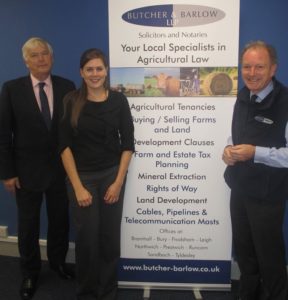Basic Payment Scheme: Update
Mike Bracegirdle, Head of Agriculture at Butcher & Barlow, highlights why it is important for both farmers and landowners to continually review their business plans.
DEFRA has recently announced that the greening element of the Basic Payments Scheme (BPS) will be dropped next year.
This has come as no real surprise and has been generally welcomed. The policy of seeking to force farmers into maintaining ecological focus areas and / or crop diversification has, in real terms, been a failure, doing little to enhance the environment.
As a positive the 30% of the BPS that greening would normally unlock will now become part of the standard part of BPS. As a negative DEFRA have confirmed again that the BPS will be phased out from next year, starting in 2021 with a 5% cut for smaller claimants and up to 25% on payments more than £150,000. We are also advised the greening monies will be “ring fenced” but this only applies to the end of the current government.
With government borrowing at record levels and the Chancellors tax take likely to be squeezed in a post COVID -19 recession (plus as yet no trade deals in place as regards Brexit), Farmers and Landowners must prepare for the possibility of both rising taxes and falling public expenditure.
DEFRA have indicated that the reduction in BPS will be met in part by “alternative support” such as productivity grants and the Environmental Land Management (ELM) scheme. This may or may not prove to be the case, but the general view is that the support for farmers and landowners from the public purse will overall diminish, at the same time as taxes increasing, with uncertainty in certain sectors of agriculture post Brexit.
Farmers and landowners need to review their business plans and manage any debt making sure they have less costly and more importantly flexible borrowing in place, ensuring cash flow will be as certain and constant as possible. Trade debts need to be chased. Trading structure must give their core assets protection for example by forming limited companies and separating the trading business from the freehold property interests. Farm diversification should be considered. Employment contracts should be reviewed. Where possible economies of scale and machinery sharing arrangements should be sought.
How can Butcher & Barlow assist?
Our Agriculture team spans commercial property, business law, succession planning and dispute resolution. The can assist with, amongst other things
- Separating property ownership from trading entities
- Advice on financial re-structure and perfecting re-mortgages
- Chase trade debtors for payment and setting up debt recovery schemes
- Reviewing trading structures with advice on both the creation of limited companies and limited liability partnerships
- Contract review and management

Contact the team on 01606 334309 or email agriculture@butcher-barlow.co.uk for a no obligation discussion